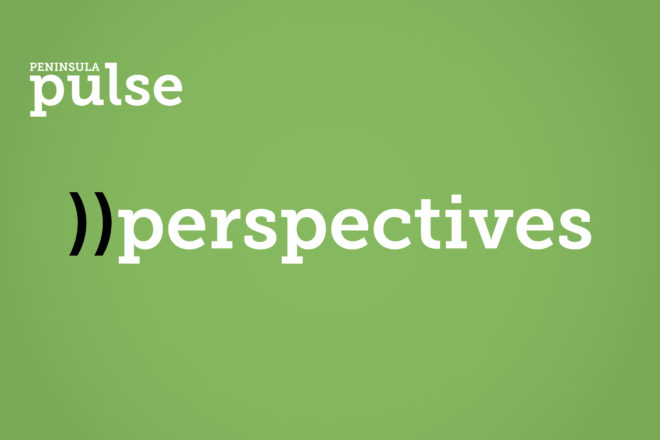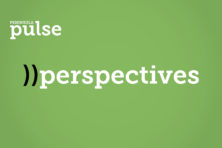Pulse of Philanthropy: The Problematic Shift from ‘We’ to ‘I’
- Share
- Tweet
- Pin
- Share

by BRET BICOY, President and CEO, Door County Community Foundation
I read something truly fascinating the other day that is indicative of a troubling trend in our nation: During the past 50 years, in all the books published in the United States, the frequency of the word “I” has doubled.
This fact comes from Robert Putnam’s book, The Upswing: How America Came Together a Century Ago and How We Can Do It Again. Putnam is a Harvard professor best known for his groundbreaking research into our country’s loss of social capital. He summarized his original findings 25 years ago in the landmark book Bowling Alone.
The title comes from Putnam’s observation that more Americans were bowling than ever before, yet rather than joining with friends and neighbors in bowling leagues, most were, instead, bowling alone. His research documented the slow erosion of interpersonal connections that have bound Americans together for generations.
The predilection of Americans to join with one another in service of a common purpose has been the essential ingredient in our country’s success. Consider the document that gave birth to our nation, the Declaration of Independence. It begins with our country’s founding principle: “We hold these truths to be self-evident, that all men are created equal, that they are endowed by their Creator with certain unalienable Rights, that among these are Life, Liberty and the pursuit of Happiness.” Yet to realize these rights, our founders set forth an equally important and, at the time, uniquely American principle: that our success as a country requires us to commit to our fellow citizens.
Our founders explicitly rejected the idea that a monarchy, church or aristocracy should command our loyalty. They were imagining a new kind of nation in which our first loyalty was to each other, so they explicitly bound themselves to one another. Recall the last sentence of our most hallowed national document: “And for the support of this Declaration, with a firm reliance on the protection of divine Providence, we mutually pledge to each other our Lives, our Fortunes and our sacred Honor.”
During the 25 years since Bowling Alone, Putnam has documented that the decline of our shared commitment has only accelerated. In The Upswing, he identifies common trends across economics, politics, society and culture. He defines a “meta-trend, a phenomenon we have come to call the ‘I-we-I’ curve: a gradual climb into greater interdependence and cooperation [which peaked about 50 years ago], followed by a steep descent into greater independence and egoism [today].”
This waning of one of the founding principles that is essential to American greatness – our willingness to mutually pledge to each other our lives, our fortunes and our sacred honor – is undermining the very thing that makes our liberty possible.
Two centuries ago, Alexis de Tocqueville, a young French political scientist, visited the United States to study our new form of government. His book Democracy in America remains an iconic summary of American society and political life.
“Americans of all ages, all conditions and all dispositions constantly form associations,” wrote Tocqueville. “If it be proposed to inculcate some truth, or to foster some feeling, by the encouragement of a great example, they form a society.”
This was a completely foreign concept to Europeans such as Tocqueville. In his experience, ordinary people did not voluntarily band together around causes of their own choosing.
“I met with several kinds of associations in America of which I confess I had no previous notion; and I have often admired the extreme skill with which the inhabitants of the United States succeed in proposing a common object to the exertions of a great many men, and in inducing them voluntarily to pursue it.”
Tocqueville was surprised that these associations of ordinary people weren’t organized or led by those of high office or great public stature. Instead, they were gatherings of regular citizens. This simply was not how things were done in the “great” nations of his time.
“Wherever, at the head of some new undertaking, you see the government in France, or a man of rank in England, in the United States you will be sure to find an association,” wrote Tocqueville. “Thus, the most democratic country on the face of the earth is that in which men have, in our time, carried to the highest perfection the art of pursuing in common the object of their common desires, and have applied this science to the greatest number of purposes.”
This ability to come together in common purpose, to commit to one another as a united people, has long formed the central tenet of American exceptionalism. Yet as we increasingly turn away from the “we” to focus on the “I,” it has become politically advantageous for demagogues to demonize those who are different or who have opinions that differ from their own. Rather than enter civic life rooted in a shared identity as Americans, we are increasingly segregating ourselves by our differences and thereby losing our willingness to commit our lives, our fortunes and our sacred honor to each other in service of the whole. The implications of this shift are profound and enormously troubling.
“As Tocqueville rightly noted, in order for the American experiment to succeed, personal liberty must be fiercely protected, but also carefully balanced with a commitment to the common good,” writes Putnam. “Individuals’ freedom to pursue their own interests holds great promise, but relentlessly exercising that freedom at the expense of others has the power to unravel the very foundations of the society that guarantees it.”
Thankfully, the lessons of our past form a road map for our national rejuvenation. Putnam notes that between 1870 and 1920, Americans founded more civic organizations at a greater rate than at any other point in history. This explosion of shared civic action formed the foundation of a renewed national commitment to serving a common – and more inclusive – good.
Consider the collective national accomplishments that were to follow: victory over Nazi tyranny, women’s suffrage, overcoming the Depression, rural electrification, civil rights, the national highway system and so many other blessings that we all enjoy today. The seeds of these shared national successes were planted in ground made fertile by earlier local collective efforts in communities across the nation.
Today, hope can be found in the rebirth of local organizations and charitable groups whose work reminds us that the “we” must be central to our identity if our communities and our nation are to thrive.
In my next column, I’ll write about some of the efforts underway on our peninsula to help the people of Door County bind themselves to one another in service of a better future for us all.
Contact Bret Bicoy at [email protected].

